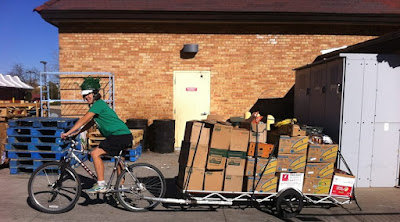 |
| Register of Initiatives in Pedal Powered Logistics - RIPPL #25 The RIPPL blog continues at the website RIPPL.BIKE |
 |
| Photo credit: Boulder Food Rescue |
The two cities are also home to Food Rescue organisations Denver Food Rescue and Boulder Food Rescue, both of which use volunteer-ridden bikes with trailers to collect food which would otherwise be discarded from grocery stores. The same trailer bikes then deliver the food to projects which distribute free groceries to people on low-incomes.
 |
| A convoy of volunteers on the move in Denver. Photo credit: Denver Food Rescue |
This in turn allows those on low incomes access to the superior nutrition provided by fresh produce. The central idea behind food justice is that giving everyone access to good quality food will lead to favourable and more equitable social outcomes. Nationally, levels of food waste in the US are staggering; estimates range between 30 and 50%, depending upon the source. USDA aims to halve the amount of wasted food by 2030.
Against this backdrop, the Food Rescue concept appears to be spreading, with initiatives popping up neighbouring towns in Colorado and as far-afield as Wyoming and Seattle (some of which were set up by former Denver and Boulder volunteers). In response, Boulder Food Rescue has set up the Food Rescue Alliance, a peer learning network which aims to provide free support to start-up initiatives focusing on food waste. The Food Rescue Alliance also organises annual “un-conferences” on food justice and has developed the Food Rescue Robot, a web application that helps food rescue groups to keep track of all of the tasks required to run a food rescue initiative.
 |
| Volunteers use normal bikes to tow the trailers. Photo credit: Boulder Food Rescue |
Boulder Food Rescue estimates that 80% of their transport is carried out by bike. Even offshoot initiative Colorado Springs Food Rescue, operating in a city with a significant urban sprawl, manage 50% of their deliveries by bike. These figures are high for American cities in which so coverage of cycling infrastructure is patchy at best. Although in general Colorado is seen as fairly progressive when it comes to provision of cycling infrastructure, it is for the most part currently still at an early stage of development. Like many car-dominated cities at similar stages, it is therefore thought of by many as a hostile environment in which to ride a bike.
 |
| Denver Food Rescue volunteers prepare a load. Photo credit: Denver Food Rescue |
Organisation: Denver Food Rescue and Boulder Food Rescue
Sector: Voluntary
City: Boulder and Denver, Colorado
Country: USA
Basis: Permanent
Website: https://denverfoodrescue.org, https://www.boulderfoodrescue.org
Facebook: Denver Food Rescue Facebook, Boulder Food Rescue Facebook
Twitter: Denver Food Rescue Twitter, Boulder Food Rescue Twitter
Sources:
Denver Food Rescue Annual Report 2016 (opens pdf)
Urban Conversion: "How to Start Your Own Food Rescue"
Urban Conversion: "Boulder Food Rescue – A Catalyst for Change"
Westword: “Food Rescue Ride Connects Denver Communities With Free, Fresh Produce”
The Atlantic: “Why Americans Lead the World in Food Waste”
United States Department of Agriculture (USDA): “U.S. Food Waste Challenge / FAQ's”
Ultra Fifty Two Eighty: “A Great Cause In Your Backyard | Denver Food Rescue”
The Fill: “How Denver Food Rescue is Reducing Food Waste One Pedal at a Time”
CBS Denver: “Cyclists Rescue Produce For Those In Need”
The Huffington Post: “Boulder Food Rescue: From Passion To Impact, Redefining Food Systems”
City of Boulder, Colorado: “City partners with Boulder Food Rescue to evaluate food waste in Boulder”
RIPPL is powered by Topsector Logistiek

